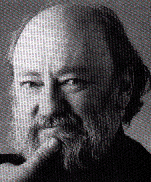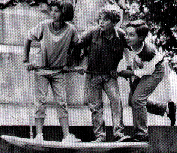






|
Rock Demers
A Spinner of "Childhood" Tales
The mention of "Tales for All" brings a smile to the faces of thousands around the world) but many Canadians have still to discover the productions of Rock Demers. Rock Demers is becoming the quiet hero of Canadian "childhood" films throughout Canada. Already an institution in his native Quebec, he has been a part of the Quebec film world for over thirty years, and he has been an energetic film producer since 1984. Although Rock Demers may not be a household name, thousands of children around the world have lived through the adventures of The Dog Who Stopped the War, the real emotion of Bach and Broccoli and the fantasy of The Great Land of Small. Those in the know are in for another treat as Vincent and Me opens in theatres across Canada. Who is this man who has won such a happy following? Rock Demers has spent his entire life with film. After growing up in rural Quebec, Demers trained as a teacher. His unquenchable love of film led him to a diploma in audio-visual technology at the é Normale de St. Cloud in Paris. Then followed two years of travel in Europe and Asia, travels during which he met many of his future collaborators: Vojta Jasny and Bretislav Pojar of Czechoslovakia and Krzyszt of Zanussi of Poland. During the 1960s Demers introduced the work of these same colleagues to Quebec in organizing the Montréal International Film Festival. It was at this time that he developed his own import export film company, Faroun Films, which specialized in international films for the young. Between 1977 and 1979 he was increasingly active in the Quebec film scene and formed the Institute Quebecois du Cinema, a government agency which assists in the development of the private film industry. 
Throughout the 1960s and 1970s Demers was active in the development of policy, funding agencies and festivals of Canadian and Quebec cinema. For this enormous contribution he was Tommy Tricker and the Stamp Traveller awarded the coveted Albert Tessier Prize by the Quebec government in 1987. In 1980 Demers decided to put his own hand to the production of films. He concentrated on family films which to this day are in his mind the most worth while and reflect his own values and philosophy. From the start, he conceived "Tales for All" as a series and laid down detailed plans for twelve films; the scripts for eight had already been commissioned before the shooting of the first began. Many of the "Tales for All" films have been international co-productions which have allowed Demers to gather together some of the world's best filmmakers. The Dog Who Stopped the War began the series in 1986; it will end in 1991 with Urgu, a Canadian Czechoslovakian co-production which will mix film with animation. Throughout his series, Demers has sought to present youth with alternatives to the Rambo-like violence of American cinema: Tommy Tricker and the Stamp Traveller has been lauded by philatelic organizations for having created a new interest in stamp collecting; Vincent and Me presents the hero as artist, potentially developing in a young viewer an aesthetic and artistic confidence not easily achieved in other ways. Demers' films, which have collected over one hundred awards at festivals around the world, have a freshness that never insults the intelligence of his young viewers (ages twelve to fourteen). His films delve into the psyche of his protagonists and broach the problems of the young, whether they be peer acceptance, the search for affection or artistic expression, or dealing with the young viewer's basic fears and concerns about growing up and independence. The freshness is due partly to his young actors, who are not taken from the professional ranks and who are never used twice. "Children change too quickly at that age," says Demers. The series "Tales for All" has no one thread running through it apart from the basic philosophy of the producer. "In our times," says Demers, "the main value of society seems to be money. I would like to emphasize the importance of that which cannot be bought spiritual values." Although each story is completely different in theme, character and style, the message always reflects Demers' philosophy of life, his system of values: people are never all bad or all good. "I have never met anyone who did not have both," says Demers. "The young understand that beneath the surface people are all the same. Perhaps there would be more peace in the world if we all felt at home in different parts of the world and felt that we are all intrinsically the same." 
Why is Demers convinced that his viewers prefer a gentler film than what is currently being offered by most distributors? "People do not want to be wounded psychologically on a regular basis. My films heal the wounds of violence. They are not escapist; they say, "Life is hard, but it is worth living -the richness we possess is the potential in all of us." Children need to feel that potential as much as adults, if not more." On the subject of the kinds of films available to children today, Demers is adamant: "We are killing our children with violence; we no longer give them a reason to live. I can continue to make gentle films, and I know that my young audience enjoys them and has a value to take away with them. But someone has to lead them to this type of film. That is the role of parents to choose a more gentle film for their children." What does Demers plan for the future? Certainly, family cinema is still the ultimate goal, but the next step is from an adult's point of view. Perhaps Demers is headed towards answering the social and psychological dilemmas of the young adults of our time. Now that the series 'Tales for All" is nearing completion, Demers is planning more family films, but this time concentrating on more adult themes: a film about Vaclav Havel, seen through the lens of director Milos Forman; the struggle of a young Montréal couple to adopt a child in post-Ceaucescu Romania; the clash of cultures within a young Hindu student at Concordia University; the story of a German prisoner of war working on a Quebec farm, as remembered by a child of the time. What does Demers wish for the moviegoers of our time? "I wish that the people of Canada might have the opportunity to see films other than those made in the U.S.A. In English Canada, there are some excellent films, but there seems to be a natural prejudice against what we do in favour of American products." Barbara Zatlokal is Director of Publishing at the Canadian Library Association. Tales for All (produced by Rock Demers) Bach and Broccoli. By Andre Melancon. Les Productions La fête, 1986. 35 mm/16mm/video. 95 min. Available in French as Bach et Bottine. (no. 3) Bye Bye Red Riding Hood. By Marta Meszaros. Les Productions La fête, 1989. 35 mm/16 mm/video. 94 min. Available in French as Bye bye chaperon rouge. (no. 9) The Case of the Witch That Wasn't. By Jean Beaudry. Les Productions La fête, 1990. 35 mm/16 mm/video. 92 min. Available in French as Pas de repit pour Melanie. (no.10) The Dog Who Stopped the War. By Andre Melancon. Les Productions La fête, 1984. 35 mm/16 mm/video. 88 min. Available in French as La guerre des tuques. (no. 1) The Great Land of Small. By Vojta Jasny. Les Productions La fête, 1987. 35 mm/16 mm/video. 93 min. Available in French as C'est parce qu'on est petit qu'on peut pas etre grand! (no. 5) The Peanut Butter Solution. By Michael Rubbo. Les Productions La fête,1985. 35mm/16mm/video. 90min. Available in French as Operation beurre de pinottes. (no. 2) Summer of the Colt. By Andre Melanson. Les Productions La fête, 1989. 35mm/16mm/video. 100 min. Available in French as Fierro . . . I'ete des secrets. Available in Spanish as El Verano del potro. (no. 8)Tadpole and the Whale. By Jean-Claude Lord. Les Productions La fête, 1988. 35 mm/16 mm/video. 90 min. Available in French as La grenouille et la baleine (no. 6) Tommy Tricker and the Stamp Traveller. By Michael Rubbo. Les Productions La fête, 1988. 35 mm/16 mm/video. Available in French as Les aventuriers du timbre perdu. (no.7) Vincent and Me. By Michael Rubbo. Les Productions La fête, 1990. 35 mm/16 mm/video. 100 min. Available in French as Vincent et moi. (no. 11) The Young Magician. By Waldemar Dziki. Les Productions La fête, 1987. 35 mm/16 mm/video. 99 min. Available in French as Le jeune magicien (no. 4) All titles are also available in book form in French from Les Editions Quebec/Amerique in the "Contes pour tous" series and in English translation from Montréal Press (Editions Quebec/Amerique). More information on the films may be obtained by writing to Les Productions La fête, 225 Roy Street East, Suite 203, Montréal, Quebec H2W 1M5; (514) 848-0064. |


1971-1979 | 1980-1985 | 1986-1990 | 1991-1995

The materials in this archive are copyright © The Manitoba Library Association. Reproduction for personal use is permitted only if this copyright notice is maintained. Any other reproduction is prohibited without permission.
 Digital Collections / Collections Numérisees
Digital Collections / Collections Numérisees

cm@umanitoba.ca